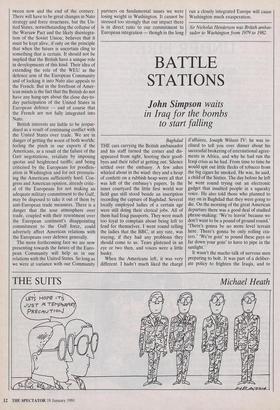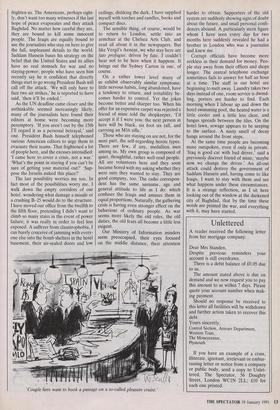BATTLE STATIONS
John Simpson waits
in Iraq for the bombs to start falling
Baghdad THE cars carrying the British ambassador and his staff turned the corner and dis- appeared from sight, hooting their good- byes and their relief at getting out. Silence settled over the embassy. A few ashes whirled about in the wind: they and a heap of confetti on a rubbish heap were all that was left of the embassy's papers. In the inner courtyard the little first world war field gun still stood beside an inscription recording the capture of Baghdad. Several locally employed ladies of a certain age were still doing their clerical jobs. All of them had Iraqi passports. They were much too loyal to complain about being left to fend for themselves. I went round telling the ladies that the BBC, at any rate, was staying; if they had any problems they should come to us. Tears glistened in an eye or two then, and voices were a little husky.
When the Americans left, it was very different. I hadn't much liked the chargé d'affaires, Joseph Wilson IV: he was in- clined to tell you over dinner about his successful brokering of international agree- ments in Africa, and why he had run the Iraqi crisis as he had. From time to time he would spit out little flecks of tobacco from the big cigars he smoked. He was, he said, a child of the Sixties. The day before he left he went round trying out an electronic gadget that insulted people in a squeaky voice. He also told those who planned to stay on in Baghdad that they were going to die. On the morning of the great American departure there was a good deal of studied phrase-making: 'We're leavin' because we don't want to be a pound of ground round.' `There's gonna be no more level terrain here. There's gonna be only rolling cra- ters.' 'We're goin' to pound these guys so far down your goin' to have to pipe in the sunlight.'
It wasn't the macho talk of nervous men preparing to bolt. It was part of a deliber- ate policy to frighten the Iraqis, and to frighten us. The Americans, perhaps right- ly, don't want too many witnesses if the last hope of peace evaporates and they attack Baghdad. No matter how careful they are, they are bound to kill some innocent people. The Iraqis are equally bound to use the journalists who stay on here to give the full, unpleasant details to the world. Saddam Hussein bases his strategy on tile belief that the United States and its allies have no real stomach for war and no staying-power; people who have seen him recently say he is confident that directly things start to go wrong President Bush will call off the attack. 'We will only have to face two air strikes,' he is reported to have said, 'then it'll be ended.'
As the UN deadline came closer and the unthinkable seemed increasingly likely, many of the journalists here found their editors at home were becoming more peremptory. 'If you aren't out by the 15th I'll regard it as a personal betrayal,' said one. President Bush himself telephoned various American editors to urge them to evacuate their teams. That frightened a lot of people here, and the excuses intensified: 'I came here to cover a crisis, not a war.' 'What's the point in staying if you can't be sure of getting your material out?' Sup- pose the Israelis nuked this place?'
The last possibility worries me too. In fact most of the possibilities worry me. I walk down the empty corridors of our hotel, wondering what damage a missile or a crashing B-25 would do to the structure. I have moved our office from the twelfth to the fifth floor, pretending I didn't want to climb so many stairs in the event of power failure; it was really in order to feel less exposed. A sufferer from claustrophobia, I can barely conceive of jamming with every- one else into the bomb shelters in the hotel basement, their air-sealed doors and low ceilings; disliking the dark, I have supplied myself with torches and candles, books and compact discs.
The sensible thing, of course, would be to return to London, settle into an armchair at the Chelsea Arts Club, and read all about it in the newspapers. But like Vergil's Aeneas, we who stay here are fato profugus: driven by fate. I couldn't bear not to be here when it happens. It brings out the Sydney Carton in one, of course.
On a rather lower level many of us exhibit observably similar symptoms: little nervous habits, long abandoned, have a tendency to return, and irritability be- comes harder to control. Yet the jokes become better and sharper too. When his offer for an expensive carpet was rejected a friend of mine told the shopkeeper, `I'd accept it if I were you: the next person in here will be black, six foot six tall, and carrying an M16 rifle.'
Those who are staying on are not, for the most part, the self-regarding heroic types. There are few, if any, medallion men among us. My own group is composed of quiet, thoughtful, rather well-read people. All are volunteers here and they soon became bored with my asking whether they were sure they wanted to stay. They are good company, too. The radio correspon- dent has the same surname, age and general attitude to life as I do: which confuses the Iraqis and amuses them in equal proportions. Naturally, the gathering crisis is having even stronger effect on the behaviour of ordinary people. As war seems more likely the old rules, the old duties, the old fears all become a little less exigent.
Our Ministry of Information minders seem preoccupied, their eyes focused on the middle distance, their attention
'Couple here want to book a passage on a so-called pleasure cruise.'
harder to obtain. Supporters of the old system are suddenly showing signs of doubt about the future, and small personal confi- dences abound. A particularly stern figure whom I have seen every day for two months here suddenly revealed he had a brother in London who was a journalist and knew me.
Corrupt officials have become more reckless in their demand for money. Peo- ple stay away from their offices and shops longer. The central telephone exchange sometimes fails to answer for half an hour at a time. The staff in our hotel are beginning to melt away. Laundry takes two days instead of one, room service is dwind- ling, porters are harder to find. Each morning when I labour up and down the hotel swimming pool, the heated water is a little cooler and a little less clear, and fungus spreads between the tiles. On the hotel lawn, sewage appears to be seeping to the surface. A nasty smell of decay hangs around the front steps.
At the same time people are becoming more outspoken, even if only in private. 'Iraq is good car with bad driver,' said a previously discreet friend of mine; 'maybe now we change the driver.' An all-out attack could destroy the government of Saddam Hussein and, having come to like Iraqis, I want to stay with them and see what happens under these circumstances. It is a strange reflection, as I sit here looking out of the window at the darkened city of Baghdad, that by the time these words are printed the war, and everything with it, may have started.



















































 Previous page
Previous page